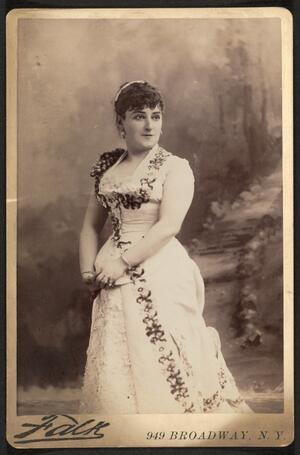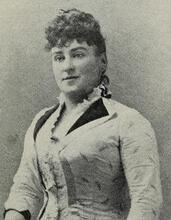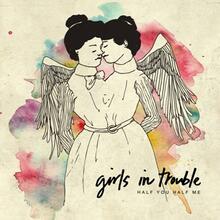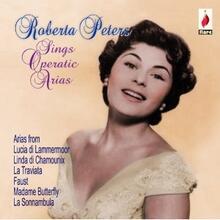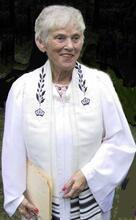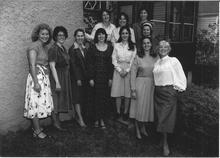Julie Rosewald
Julie Eichberg Rosewald, America’s first known woman cantor, served as “Cantor Soprano” at Temple Emanu-El in San Francisco between 1884 and 1893, despite traditional Jewish restrictions of kol isha. Rosewald’s role was unique in America until the mid-twentieth century, as she sang the solo parts in all services for her congregation, chose the music, served as choir director, collaborated with the organist, and directed the music of the synagogue. She had an illustrious musical career as a successful international opera star, composer, author, teacher, and professor of music. Coming from a family of cantors, she and her husband, Jacob H. Rosewald, participated in Jewish musical events and charity work, primarily in Baltimore and San Francisco.
Julie Eichberg Rosewald, America’s first known woman cantor, served as “Cantor Soprano” at Temple Emanu-El in San Francisco between 1884 and 1893, despite traditional Jewish restrictions of kol isha (voice of a woman) that prohibit women from singing or leading worship. Rosewald sang the solo parts in all services for her congregation, chose the music, served as choir director, collaborated with the organist, and directed the music of the synagogue. Her role was unique in America until the mid-twentieth century. Serving as a cantor was only one aspect of an illustrious career. Rosewald achieved fame and fortune and was brilliantly successful internationally in opera. She was also a composer, author, teacher, and full professor of music at Mills College of Music. Her Jewish background included the study of Hebrew and chazzanut (Jewish liturgical music), through her family of cantors. Accompanied by her husband, Jacob H. Rosewald, she sang in the Baltimore community and participated in Jewish musical events and charity work.
Background
Born March 7, 1847, Rosewald grew up in a cantorial family. Her grandfather, Samuel Jonas Eichberg, had been a cantor and kosher butcher in Mergentheim, Germany, and her father, Moritz Eichberg, was a cantor in Stuttgart. Her mother, Eleanor Seligsberg Eichberg, was also musical. All five children, Pauline, Emilie, Bertha, Julia, and Antonie, received musical educations, with three daughters, Pauline, Julie, and Bertha, achieving performance careers. Other family members, including uncles and cousins, were cantors or instrumental musicians. Cantor Eichberg educated all his children in Hebrew and Jewish studies. It was through her father’s school that Rosewald learned the southern German chazzanut.
Rosewald’s distinctive musical talents were recognized and encouraged at an early age. She studied at the Stuttgart Conservatorium and then at the Royal Theatre School in Stuttgart, where she fell in love with opera and gained ambition for a stage career. She immigrated to America in 1865, where she concertized with her sister Pauline Weiller. In 1866, she married Jacob Rosewald, a Baltimore native, teacher, violinist at the Peabody Conservatory, and choral conductor of the local Liederkranz (a type of Männerchöre, a men’s singing society). The Rosewalds participated together in the musical life of Baltimore in both the general and Jewish communities, including working with Rev. Dr. Benjamin Szold at his congregation and with Har Sinai Temple and elsewhere.
Early Career
In 1870, Rosewald returned to Europe for further musical training, studying with Maria von Marra (1822–1878) in Frankfurt and Pauline Viardot-Garcia (1821–1910) in Paris. In 1872, she accompanied the famous composer and conductor Franz Abt (1819-1885) on his concert tour to the United States, from which she garnered tremendous recognition. In 1875, Rosewald arranged for C.D. Hess (1838–1909), an important opera impresario, to hear her sing in Baltimore. He was so impressed that he immediately arranged her debut for that same year as Marguerite in Faust, with the Kellogg Opera Company under the direction of Max Strakosch (1835-1892). Hess then engaged Rosewald for a season in California and her opera career skyrocketed. By 1876, Kellogg’s company was reorganized, and Rosewald became one of the prima donnas (lead singers).
Reviews best describe Rosewald’s voice and reveal the excellent receptions she received:
Her voice for a high soprano has an unusual compass, and it is very seldom that a voice of this character is heard with such beautiful full and clear tones in the upper register. The chest tones are round and rich, and possess strong dramatic quality. The volume is large and the timbre fine, and add to these great agility, flexibility, a fine method, and thorough cultivation, and we have in the ensemble one of the best operatic voices .… Her delivery is good and so is her phrasing. She has slight imperfections in her style, but compared with her excellencies, these are trivial, and not being traceable to natural defects, will be remedied in time. Furthermore, she acts well. In her score the staccato notes, echoes, and florid passages were brilliantly executed (“Kellogg English Opera”).
Rosewald started off with a repertoire of fifteen operas, an extraordinary feat for anyone to master for a three-month engagement. Within two years with Kellogg’s company, she had added significantly to her repertoire.
International Opera Career

Photo from A Woman of the Century: Fourteen Hundred-Seventy Biographical Sketches Accompanied by Portraits of Leading American Women in All Walks of Life, Frances E. Willard and Mary A. Livermore, eds. (Buffalo: Charles Wells Mouton,1893), 1812.
Starting with the 1877–1878 opera season, Rosewald began a European tour, debuting in Nuremburg and singing opera with companies in Amsterdam, Basel, Prague, Frankfurt, Mayence, Stuttgart, Cologne, and Dresden. She achieved many of her greatest successes with the Dresden Royal Opera. In 1880, Eduard Hanslick (1825-1904), the eminent critic, praising her lavishly, asserted that she was among the foremost dramatic singers at the Royal Opera. He keenly valued her unusually large repertoire.
Upon her return to the United States, the Grand English Opera Company organized and run by Emma Abbott (1850-1891), engaged Rosewald as a prima donna and her husband as violinist and later as conductor. Abbott’s productions were in English, with small orchestras and extravagant costumes. They were held in venues all over America. By the fall of 1881, Rosewald had again gained top billing. At the peak of her career, she is reputed to have sung in thirty operas in one seven-week period with the Abbott Company. Rosewald achieved success, fame, and fortune through her opera career.
Cantor Soprano
The Rosewalds decided to move to San Francisco, primarily due to Jacob’s failing health, and arrived on August 10, 1884. Within a few weeks, the Jewish community called on them for help in a musical emergency. Cantor Max Wolff (1839–1884), who had served the large congregation Temple Emanu-El, had succumbed to illness. On extremely short notice, Rosewald took over the role of cantor and led the services for High Holidays. Her contribution was well received. On September 26, 1884, a local newspaper, The Jewish Progress, reported that “The services of the various synagogues on The Jewish New Year, held on the first and second days of the Hebrew month of Tishrei. Referred to alternatively as the "Day of Judgement" and the "Day of Blowing" (of the shofar).Rosh Hashanah were thoroughly in accord with the solemnity of the occasion.… The singing was a feature of the service, Mrs. Rosewald at the Temple Emanu-El filling her arduous position with great credit” (The Jewish Progress).
Rosewald’s position at Temple Emanuel was highly unusual as no other woman had ever been named a cantor in America. It had been strictly an occupation of men, due to traditional restrictions prohibiting women from leading prayer. At that time in the United States there were no cantorial training schools. Men learned through an apprenticeship system with a seasoned cantor.
Rosewald’s combination of Jewish education, including knowledge of Hebrew and chazzanut, familiarity with the Reform liturgy and practice from Baltimore, a prodigious memory, and highly valued singing skills, made her an excellent choice to take up the role. Rosewald’s position as a recognized prayer leader was unique at the time she began her role as cantor.
During her nine-year tenure with Temple Emanu-El, Julie Rosewald was fondly referred to as “Cantor Soprano.” Musical services at Temple Emanu-El strove to be sophisticated and elaborate. She introduced the congregation to new works by Jewish composers and others, including temple organist Louis Schmidt. She brought in new adaptations of contemporaneous classical music, sometimes arranging the music herself, and thus shaped the direction of musical taste. Rabbi Voorsanger (1852-1908), the chief Rabbi at the time, referred to her as “the distinguished singer in Israel,” a term often associated with cantors.
Marchesi of the Pacific Coast
After leaving her position at Temple Emanu-El, Rosewald continued working as a renowned music teacher. She was integral to founding the vocal department at the Conservatory of Music of Mills College from 1894 to 1897. Her teaching was considered on par with the best of the Italian school of vocal technique at the time, and she was often called the “Marchesi of the Pacific Coast.” During this time, she published an important volume, How Shall I Practice?, which outlines in detail her vocal method and techniques. Her breathing techniques were quoted in medical journals, and her instructions about loosening women’s stays became part of wider discussions on the negative impact of this confining clothing style for all women. Among other activities Rosewald loved bicycling, then a new and fashionable sport in which she engaged for the health aspects.
After 1898, Rosewald traveled extensively until she began to experience episodes of bad health. During a visit to Europe, she died suddenly on July 16, 1906, and was mourned by the music world.
The Jewish Progress, September 26, 1884: 5.
“The Kellogg English Opera.” The Chicago Inter Ocean November 23, 1876: 4.
Pinnolis, Judith. “‘Cantor Soprano’ Julie Rosewald: The Musical Career of a Jewish American ‘New Woman.’” American Jewish Archives Journal 62, no. 2 (2010): 1-53.
“The Jewish New Year: Brilliant Services at All the Synagogues.” The San Francisco Call Oct 4, 1891: 3.

